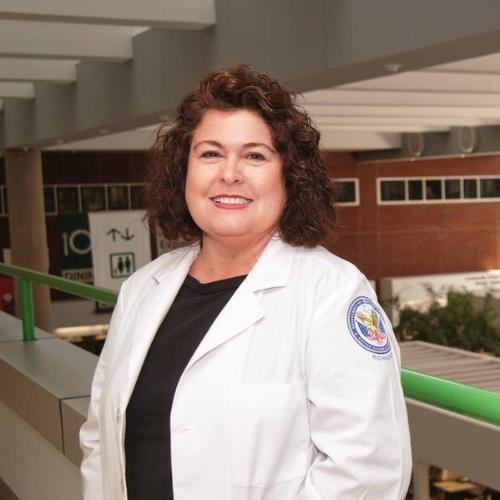Oct 9, 2025
Longtime Richmond VAMC leader brings curiosity-forward ethic to MHA & MSHA programs

Julie Beales, MD, Ph.D., MSHA joined VCU Health Administration over the summer as an assistant professor and the department’s director of professional development, bringing with her two decades of leadership and clinical experience at the Richmond Veterans Administration Medical Center (VAMC).
At the VA, Beales rose from physician in the geriatrics department to that department’s chair and later the VAMC’s chief of staff. She held the latter role for 15 years, overseeing care for roughly 70,000 veterans across the hospital and six community-based clinics.
Along the way, Beales became a champion for coordinated, patient-centered care, spearheading programs in home-based primary care, interdisciplinary care and outreach to underserved communities. “I particularly loved the interdisciplinary work with the nurses, social workers, psychologists and pharmacists,” she said. “That kind of collaboration was really in my wheelhouse.”
Her path to VCU was not a straight one. After majoring in history at the University of Richmond, she discovered a passion for science while working in a cancer research lab.
“My friend was working with an oncologist looking at cancer cells, and I was just fascinated by it, so I picked up a science major in my last year,” she says. This led her to complete a doctorate in microbiology and immunology at VCU, followed by medical school, a geriatrics fellowship and board certification in geriatrics and palliative care.
While she thrived in research and clinical care, Beales also found herself drawn to leadership opportunities. Prior to her supervisory roles at the VAMC, she completed an MSHA in the very program she now helps guide, which helps her relate to current health administration students.
“When working with students, I can approach it by saying, ‘Here are some things that would have helped me when I was going through the program,’” she said.
In her new role at VCU, Beales leads a revitalized professional development curriculum for MHA and MSHA students. She also teaches first-year MHA students the essentials of professionalism, from crafting a CV to building a strong LinkedIn profile. For second-years, she provides intensive, one-on-one coaching as they prepare for fellowships and residencies.
Beales’ transition from hospital leadership to the classroom has been both exciting and energizing.
“I’m eager to take all this knowledge I’ve gained over the years and use it in a different space, because I really like a challenge and developing programs,” she said. “I can take my real-world experience and help the students understand what will help them be successful.”
Her teaching emphasizes emotional intelligence and interpersonal skills, qualities she believes are critical for future health administrators.
“I don’t care how strong you are academically. If you can’t work with people, then you’re not going to be a good leader,” she said. “You cannot just dictate to people what they need to do. You’ve got to learn to read people and what motivates them; you have to work differently with different people.”
As she settles into her faculty role, Beales is focused on building a consistent, structured professional development program that will strengthen the department’s offerings and give students the support she knows they need to succeed. She approaches this next chapter with the same philosophy that has guided her since her early days in medicine: always embrace curiosity and seize opportunities.
“If someone asks you to work on something, even if it’s not something you absolutely love, just say yes, because it’s going to open doors,” she says. “I think you should just reach out and grab life — see a challenge as a positive opportunity, not a drag. If something comes in front of you, learn from it, embrace it and enjoy it.”